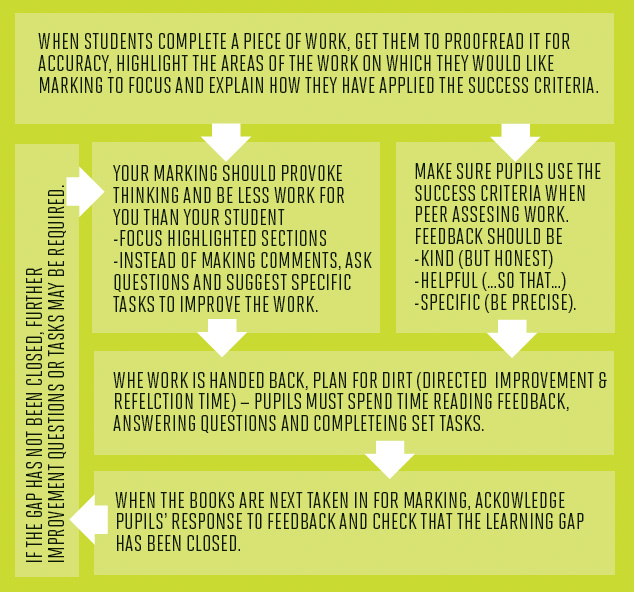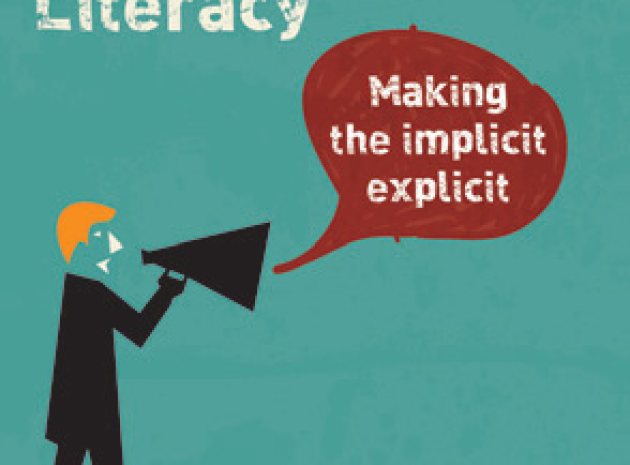David Didau’s second set of lessons he’s learnt from lessons he’s taught, is focused on the often fraught topic of marking...
Have you ever flicked back through an exercise book and seen the same old comments followed with soul numbing certainty a page or two later by the same old mistakes? Few things are more crushing to the fragile spirit of hardworking teachers than this dramatically enacted evidence of the fact that, apparently, most of the feedback they give to students falls on stony soil. I’ve always had a nagging sense of shame about marking. There’s inevitably work waiting – and when we’re tired and stressed, this chore is often the first thing to go.
Happily, the concept of DIRT (Directed Improvement Reflection Time) has transformed the millstone of marking from an imposition to, if not a pleasure, certainly a highlight of my working routine. Now, I look forward to seeing those eager little faces reading through my carefully crafted instructions on how to improve. The idea that we should dedicate part or all of a lesson to pupils acting on our feedback has been a revelation. I tell them how to improve and, by God! they do it. There’s no trick to it, no gimmick, nothing clever or mysterious; just the embedded routine of high expectations.
Here are a few of my thoughts on how to change the way you think about marking and, maybe more importantly, how you go about it:
1. Dialogue
A pupil’s exercise book can be an almost sacred space in which teachers can gently prod their charges from drab ignorance into the iridescence of knowledge and understanding. I encourage pupils to ‘talk’ to me via their books. Instead of making comments, I now ask questions: “Why have you done…”; “What might make this better?” In return they can ask their own questions, make points or clarify.
2. Presentation
I also give over lesson time to making sure that work is well presented. The expectation is that pupils will proofread their work, if it is to be marked. And if work is clearly below acceptable levels of presentation they should write it out again. You rarely have to enforce this more than once before the message sinks in: be proud of your work.
3. Planning
If I’m going to commit time to marking a set of books I want that to be time I don’t have to spend planning lesson activities. Now, because of DIRT, the marking is the activity. The more questions I ask and the more tasks I set, the more time they will be expected to spend in response. Dylan Wiliam says that feedback should be more work for the recipient than the donor and he’s right.
4. Differentiation.
There can be no better way to respond to the needs of an individual than to read what they have written and give them specific tasks to challenge them to be better than they currently are. If you mark well, you really shouldn’t have to waste time planning what to do in lessons. And you most certainly shouldn’t have to waste time planning separate activities for pupils for different abilities. All, Most, Some? Kiss my ass!
5. Time-saving
What if instead of marking everything, we only marked the bits where pupils were struggling? The solution is for pupils to highlight those areas where they really want feedback. Ask them where they’ve made mistakes or taken a risk – they’ll generally know right away which parts they’re most anxious about and this means you can hone in on the most crucial aspects of their work. Finally, I’m regularly asked how often teachers should mark books. This depends. Ideally it might be after every lesson, but that’s largely unrealistic and unsustainable. I’d tentatively suggest marking once every four lessons. This would mean that core subjects mark once a week and RE teachers aren’t too swamped. Of course there should be some leeway built in, but setting aside an hour a day for marking is time well spent. And if all that seems a bit wordy, here’s all my marking advice condensed into a handy flow chart:

About the author
David is an associate of independent thinking and has run two English departments and been an assistant head with responsibility for teaching & learning. He is the author of the best-selling ‘The perfect english lesson’ and his new book, ‘The secret of literacy’, is out in january 2014.











David Didau’s second set of lessons he’s learnt from lessons he’s taught, is focused on the often fraught topic of marking...